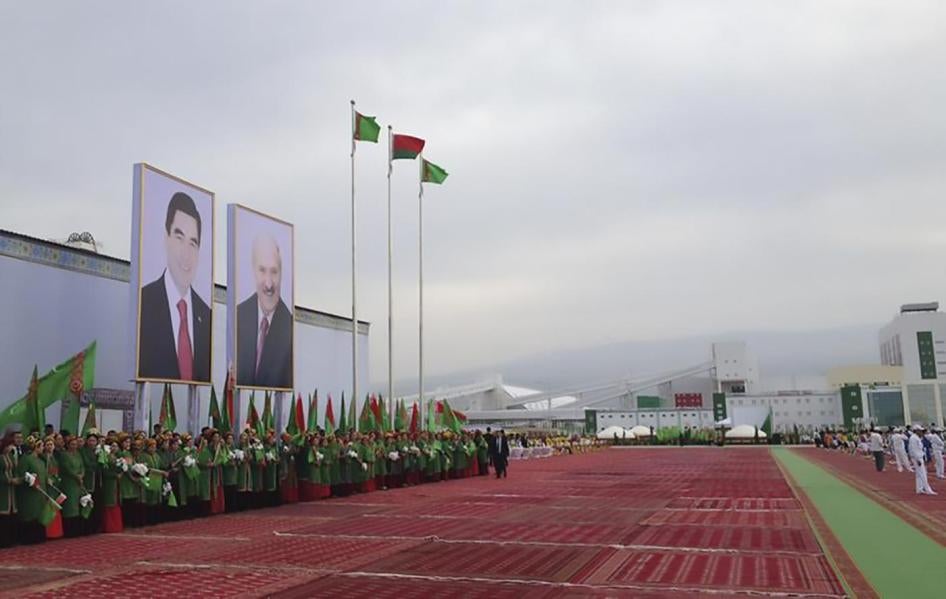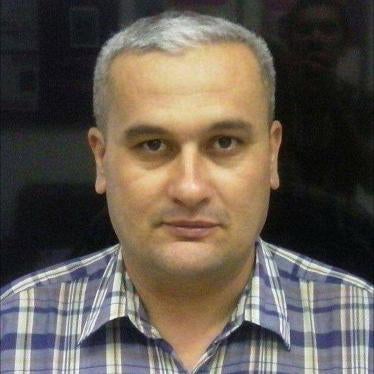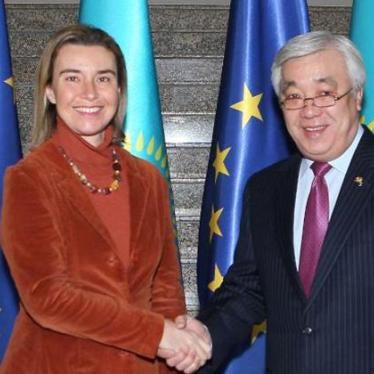(Berlin) – Political leaders in Kyrgyzstan and Uzbekistan should use the window of opportunity offered by political change in their countries to improve human rights, Human Rights Watch said today in releasing its World Report 2018. Leaders of Kazakhstan, Tajikistan, and Turkmenistan should also end repressive policies documented during 2017 and prioritize rights.
In Uzbekistan, since assuming the presidency in 2016, president Shavkat Mirziyoyev has taken several positive steps to improve human rights, but grave abuses and highly repressive government policies remain in place. In Kyrgyzstan the newly elected president, Sooronbai Jeenbekov has the opportunity to reverse recent negative trends on freedom of expression and assembly.
“Leaders in Kyrgyzstan and Uzbekistan have the chance to make game-changing decisions on human rights for their people,” said Hugh Williamson, Europe and Central Asia division director at Human Rights Watch. “Those in power across Central Asia should abandon repressive policies and take steps to allow free speech, end torture in detention, and release critics from jail.”
In the 643-page World Report, its 28th edition, Human Rights Watch reviews human rights practices in more than 90 countries. In his introductory essay, Executive Director Kenneth Roth writes that political leaders willing to stand up for human rights principles showed that it is possible to limit authoritarian populist agendas. When combined with mobilized publics and effective multilateral actors, these leaders demonstrated that the rise of anti-rights governments is not inevitable.
In Kazakhstan during 2017, the authorities silenced critics and continued a crackdown on independent trade unions, closing the Confederation of Independent Trade Unions of Kazakhstan. Tajikistan has had an ongoing, severe human rights crackdown, with further arrests of government critics and violent retaliation against the relatives of dissidents abroad. The authorities in Turkmenistan, one of the most closed and repressive countries in the world, took new steps against independent activists and reporters.
As the Kazakh government tried to boost its image, hosting high-profile international events, its human rights record further deteriorated. Authorities targeted government critics, including journalists, with politically motivated criminal charges and other harassment, and suppressed independent trade union activity. Several activists and trade union leaders remain wrongfully imprisoned. The government maintained tight controls over freedom of religion, expression, and peaceful assembly.
In Kyrgyzstan, international observers of the October 2017 president elections found it to be competitive, but noted concerns such as widespread abuse of public resources and pressure on voters. Prior to the election, authorities banned public assemblies in central Bishkek. Azimjon Askarov, a human rights defender, is serving a life sentence. Media freedom has deteriorated, with the Prosecutor General’s office bringing lawsuits against critical media and a human rights defender. Several foreign human rights workers, including from Human Rights Watch, are banned from Kyrgyzstan.
Tajikistan’s human rights record worsened further as authorities deepened a severe, widespread crackdown on free expression and association, peaceful political opposition activity, the independent legal profession, and the independent exercise of religious faith. More than 150 political activists, including a number of lawyers and journalists, remain unjustly jailed, and the relatives of dissidents who peacefully criticize the government from outside the country are subjected to violent retaliation orchestrated by authorities.
In Turkmenistan, the government effectively bans all forms of religious and political expression not approved by the authorities, tightly controls media, and allows no independent monitoring groups. Dozens of people remain victims of enforced disappearance. In 2017, Turkmenistan hosted the 5th Asian Indoor and Martial Arts Games (AIMAG), marking a rare departure from the country’s self-imposed isolation, but prompting the government to clamp down further on expression and other rights.
In Uzbekistan, president Mirziyoyev released at least 16 political prisoners, relaxed certain restrictions on free expression, removed citizens from the security services’ notorious “black list,” and increased accountability of government institutions to the citizenry. At the same time, Uzbek security services brought fresh charges against several journalists, including Bobomurod Abdullaev, Hayot Nasreddinov, and Nurullo Otahonov. Grave rights abuses such as torture, politically motivated imprisonment, and forced labor in the cotton fields persist.









